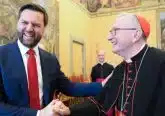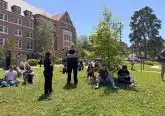Violence in Milwaukee unrest ‘a self-inflicted wound,’ says archbishop

IMAGE: CNS photo/Aaron P. Bernstein, Reuters
By
MILWAUKEE (CNS) — Archbishop Jerome E. Listecki of Milwaukee called the violence that broke out in the city as part of protests over the fatal police shooting of an African-American man “a self-inflicted wound.”
“Violence is never tolerated. Protests are certainly the right of every American, but violence such as looting, burning is never tolerated,” Archbishop Listecki told the Catholic Herald in an Aug. 15 telephone interview. “It only creates a self-inflicted wound on the community.”
Protesters burned down six businesses in the city, including a gas station, and also torched a police car late Aug. 13 in response to the police shooting of Sylville K. Smith as he fled a traffic stop earlier that day.
Police said Smith, 23, had a gun in his hand and had refused police orders to drop the weapon. Smith was African-American, as is the as-yet-unidentified officer who shot him.
“The anger and hurt that accompanies any action certainly is understandable, but violence is never justified as a response,” said Archbishop Listecki said in a statement issued later Aug. 15. Rather, he suggested “supporting the family, building the economy and attacking crime is a wonderful formula for defusing the intensity that creates the ‘burn, baby, burn’ mentality.”
In the statement, the archbishop lamented the “loss of a strong faith that builds character and creates change.”
“Faith in Jesus Christ has not changed,” he said. “However, the commitment to live that faith has become dormant. It’s time to awaken our confidence, together, in Jesus Christ and the Gospel that presents us with the only true transformation which changes hearts as well as minds.”
Calling the violence on the streets of a neighborhood that is already economically challenged “painful to watch,” Archbishop Listecki noted that “protest is a right of every American, but burning, shooting at legitimate authority and stealing are not.”
He also offered “prayers to support the families and police authorities who have been caught in this conflict, as well as pray for peace in our neighborhoods and communities in Milwaukee and throughout the world.”
The archbishop also addressed the rioting in Milwaukee in his weekly “Love One Another” email communique sent Aug. 16 to clergy, parish staff members and other church leaders throughout the archdiocese.
While the anger and hurt was understandable, he stressed that violence only begets violence.
A pot boils over with the intensity of heat, wrote the archbishop. Contributing to that boiling pot in Milwaukee, he said, is a scarcity of jobs and youth activities in the area, leaving young people prey to gangs, drugs or general mischief.
The community also must take responsibility for policing itself as the “eyes and ears reporting gang activity, drug deals and criminal activities to local authorities.”
He wrote that if the police do not respond, “we as religious leaders must take up that cause and challenge political leaders to be responsible for the sake of the community.”
Father Timothy L. Kitzke, the Archdiocese of Milwaukee’s vicar general for urban ministry, told the Catholic Herald Aug. 15 that what happened Aug. 13 could be looked at one of two ways.
“On the one hand it could be Armageddon; on the other hand, it could be seen as mission territory. I see it as a latter,” he said. “Now, more than ever, it is important that people from all of our parishes, including those in the suburbs, must pull together. The problems of racial divisiveness and helplessness must be addressed by everyone.”
Father Kitzke, who also is pastor of a Milwaukee parish and administrator of two others, said he has been in contact with the pastors of the four inner-city parishes asking them to meet with him to continue to address the concerns of the community.
“What do we do with the anger?” the priest said. “We need to address the issues that cause the anger and the hopelessness that lead to violence. And the church has to be a part of that.”
Father Kitzke also was to be a celebrant of a Mass for peace Aug. 18 at All Saints Church in Milwaukee.
An Aug. 14 statement from Religious Leaders for Racial Reconciliation in Milwaukee, formed last year to address race issues in the city, said the city “was taken to another level of violence where the devil is trying to lead us.”
The group identified three issues that need to be address with the city’s dispossessed: “We need to build relationships with them, look for the root causes of what is going wrong in their lives, and then we need to empower them to change!”
“Have you ever lost your keys? Think about that feeling you had when you couldn’t find them, looking all over, and retracing your steps backwards,” the statement said. “That is how the lost are feeling, that pit in their stomach, and emptiness in their heart, the yearning for something that they don’t yet even know what it is. They are waiting for one of us to show them his love and lead them to their Savior, Jesus!”
– – –
Contributing to this story were Maryangela Layman Roman, Colleen Jurkiewicz and Brian T. Olszewski.
– – –
Copyright © 2016 Catholic News Service/U.S. Conference of Catholic Bishops. www.catholicnews.com. All rights reserved. Republishing or redistributing of CNS content, including by framing or similar means without prior permission, is prohibited. You may link to stories on our public site. This copy is for your personal, non-commercial use only. To request permission for republishing or redistributing of CNS content, please contact permissions at [email protected].













